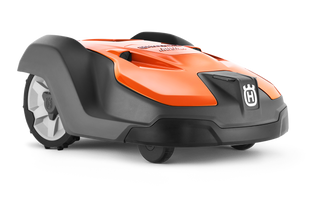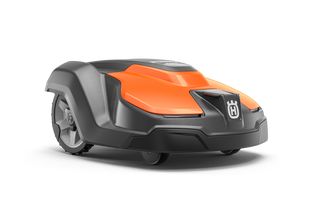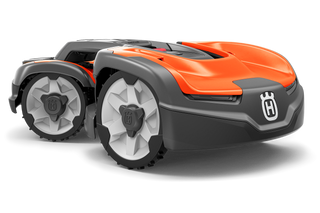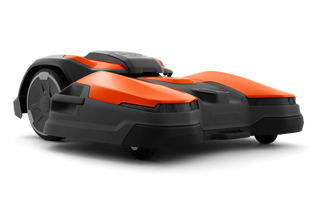How to find and repair a wire break in your Automower® installation
If the charging station for your Automower® robotic lawn mower is displaying a blue flashing light and the Automower® Connect app or the mower display show the error message No loop signal, there might be a broken wire in your installation. Watch the video and follow the steps below to solve this issue.
Perform basic initial checks
- Ensure that the boundary wire and guide wire connectors to the charging station are properly connected and undamaged. See How to connect the boundary and guide wires to the charging station.
- Check known splices in the loop wire to ensure that the wires are properly connected and couplers are not damaged. If available, use the map that was drawn during the installation to remind you where the wires were initially laid.
- If the error message persists after these initial checks, proceed with the troubleshooting steps below.
How to locate the damaged wire section
We recommend two methods to find a wire break:
Watch this video or follow the step-by-step instructions below to learn about both methods to find and repair a wire break in your Automower® installation.
Tip! To enable subtitles, start playing the video and click the gear icon for settings. Then choose “Subtitles/CC” and select from the available languages.
Manual search
A broken wire in your Automower® installation can be found using a manual search method, where the basic idea is to keep splitting the boundary wire into halves until the damaged section is found. Here’s how to do it:
1. Switch off ECO mode
This search method won’t work if ECO mode is activated. Depending on your Automower® model, you can use the Automower® Connect app or the mower‘s display to switch off ECO mode. Follow these steps:
- Place the mower in the charging station.
- Open the Automower® Connect app or press Menu on the mower‘s display.
- Select Settings > ECO mode.
- Untick the box.
2. Switch connectors in the charging station
- Switch the connections between the guide wire and boundary wire in the charging station to identify the damaged section. Start by switching connection AL and G1. If the indicator lamp has a solid green light, the break is somewhere in the boundary wire between AL and the point where the guide wire is connected to the boundary wire (thick black line in image 1). This is where you should start looking for the break.
- Note that some Automower® models have additional guide wires (G2, G3). You can repeat the procedure with them.
Image 1
3. Locate the break
Required tools and equipment
- Loop wire and Automower® Couplers (image 4)
- Automower® Connectors (image 2)
- Pliers
- Wire cutting tool
Steps to locate the break
- Disconnect the suspected broken wire: Disconnect the suspected broken wire from the charging station.
- Set up a new loop wire: Using a connector, connect one end of the new loop wire to a vacant slot on the charging station, either AL or AR.
- Cut the wire midway: Go to the middle of the suspected broken wire section and cut it.
- Connect the new loop wire: Connect the other end of the new loop wire to the wire end that is still connected to the charging station (thin line in image 3).
- Indicator lamp check: Check the charging station indicator lamp. If the lamp is green, the break is in the section with the disconnected end (thick line in image 3).
- Narrowing down the break location: If the indicator lamp keeps flashing blue, repeat this process until only a short section of the wire remains. This is where the break is located.
Tip! If the suspected damaged boundary wire section is short, it may be easier to replace it entirely rather than trying to find the exact location of the break.
Image 2
Image 3
Image 4
Manual search using a wire break detector tool
To save time and avoid cutting any wires while troubleshooting, you can use a wire break detector tool. Note that this tool is useful for finding clean wire breaks, but may not be as effective with partial wire breaks.
The video above explains how to use the wire break detector tool.
Step-by-step guide to repairing a broken wire
Required tools and equipment
- Loop wire and Automower® Couplers (image 4)
- Pliers
- Wire cutting tool
Steps to repair the broken wire
- Trim the damaged wire: Trim about 60 centimetres (2 feet) from each end of the damaged wire to remove all damaged sections.
- Insert the wire into the coupler: Insert both wire ends into the coupler, one end per hole. It doesn’t matter which hole is used for which wire end.
- Check the wire insertion: Ensure that the wires are fully inserted into the coupler; use the transparent side of the coupler for verification. If you are using PRO wire, remove the outer protective layer before inserting the wire into the coupler.
- Press the coupler: Firmly press the coupler with pliers.
- Fix or bury the wire: Prevent new wire damage by burying the exposed boundary wire and coupler or securely fixing it to the ground with staples.
Watch this video for detailed instructions on how to connect a guide wire to the boundary wire:
Why use an original Automower® Coupler?
Automower® coupler is especially designed for repairing and extending the boundary wire and connecting the guide wire. It is durable, waterproof and ensures optimal performance.
Contact your Husqvarna dealer
If you need help with your Automower® installation, contact your local Husqvarna dealer. With their experience and using specialised tools, they can help you to get your Automower® robotic lawn mower running again in no time.
Tips to prevent wire breaks in your Automower® installation
There are some simple things you can do to prevent wire breaks in your Automower® installation. Click here to learn more.























